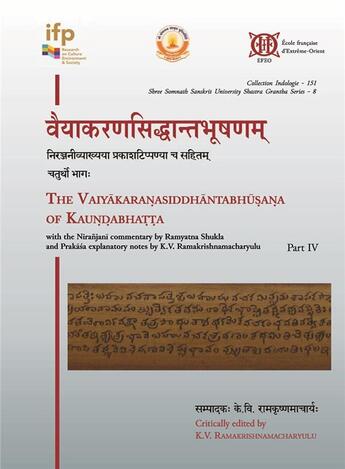Résumé:
The Vaiyakaranasiddhantabhusana, also known as the Vaiyakaranabhusana, is a commentary on the great 17th-century grammarian Bhattoji Diksita's Vaiyakaranamatonmajjana, written by Bhattoji's nephew Kaundabhatta. It is one of the most important texts of the late Paninian grammatical tradition on... Voir plus
The Vaiyakaranasiddhantabhusana, also known as the Vaiyakaranabhusana, is a commentary on the great 17th-century grammarian Bhattoji Diksita's Vaiyakaranamatonmajjana, written by Bhattoji's nephew Kaundabhatta. It is one of the most important texts of the late Paninian grammatical tradition on questions of semantics. The main intention of Kaundabhatta's commentary is to refute objections raised by proponents of the two rival systems of Logic (Nyaya) and Exegesis (Mimamsa) on various aspects of semantics, and to establish the Grammarians' views on these subjects. The Vaiyakaranasiddhantabhusanasara, an abridged version of the Vaiyakaranabhusana by the same author, is a popular work that was commented upon more than ten times. On the other hand, nobody so far has attempted to write a commentary on the Vaiyakaranabhusana itself. The present work contains the Vaiyakaranabhusana along with a commentary called Niranjani by Pandit Ramyatna Shukla and explanatory notes (Prakasa) by the editor. This fourth and last part of the work discusses specific issues of semantics: the expressive power (sakti) of words, the meaning of negation, particles, abstract suffixes, etc. It also contains an extensive discussion of the philosophical concept of sphota, one of the most fundamental notions introduced by the Paninian tradition to account for the understanding of expressive units as undivided wholes.
Donner votre avis














